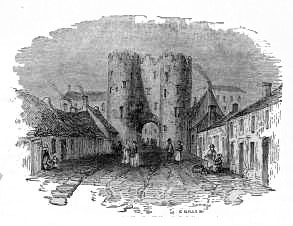Cromwell in Ireland

St. Lawrence Gate, Drogheda
Cromwell arrives in Ireland—He marches to Drogheda—Cruel Massacre of the Inhabitants after promise of Quarter—Account of an Eyewitness—Brutality of the Cromwellian Soldiers—Ladies are not spared—Cromwell's Letters—He boasts of his Cruelties—Massacre and Treachery at Drogheda—Brave Resistance at Clonmel—CharlesII. arrives in Scotland—The Duplicity of his Conduct towards the Irish—Siege of Limerick—Ireton's Cruelties and Miserable Death—The Banishment to Connaught—The Irish are sold as Slaves to Barbadoes—General Desolation and Misery of the People.
[A.D. 1649—1655.]

ROMWELL was now master of England, and ruled with all that authority which is so freely granted to a revolutionary leader, and so often denied to a lawful monarch. The great body of the English stood aghast with horror when they discovered that regicide, and the substitution of an illegal tyranny for one which at least was legal, was the end of all their hopes. The new ruler was aware of the precariousness of his position. The safety of his head, as well as the continuance of his power, depended on the caprice of the multitude; and he saw that the sword alone could maintain him in the elevated position to which he had risen, and the still more elevated position to which he aspired. We scarcely imagine him to have been more religious or less humane than many of his contemporaries, though it is evident that he required a great show of the kind of religion then fashionable to support his character as a reformer, and that he considered himself obliged to exercise wholesale cruelties to consolidate his power.
